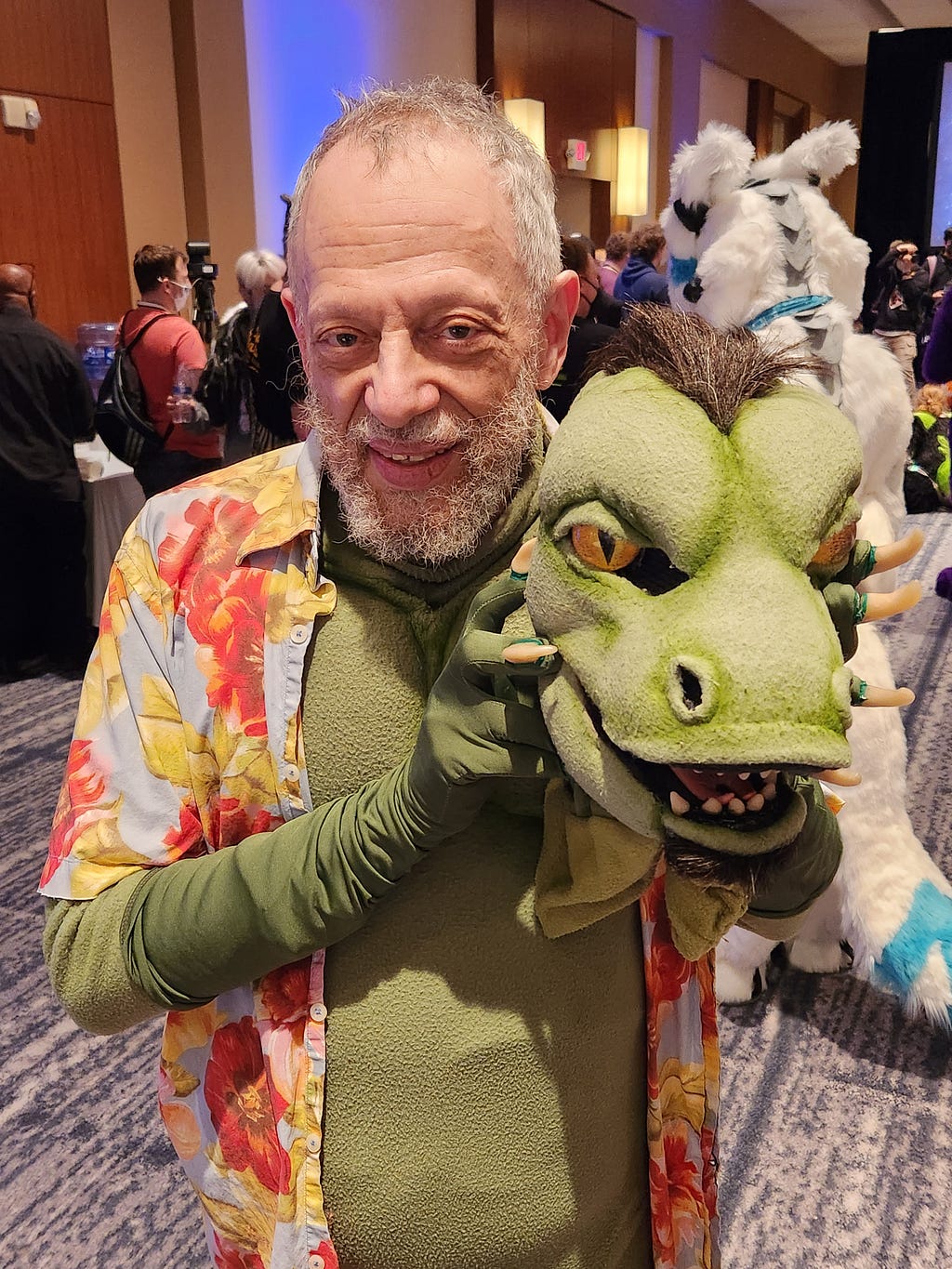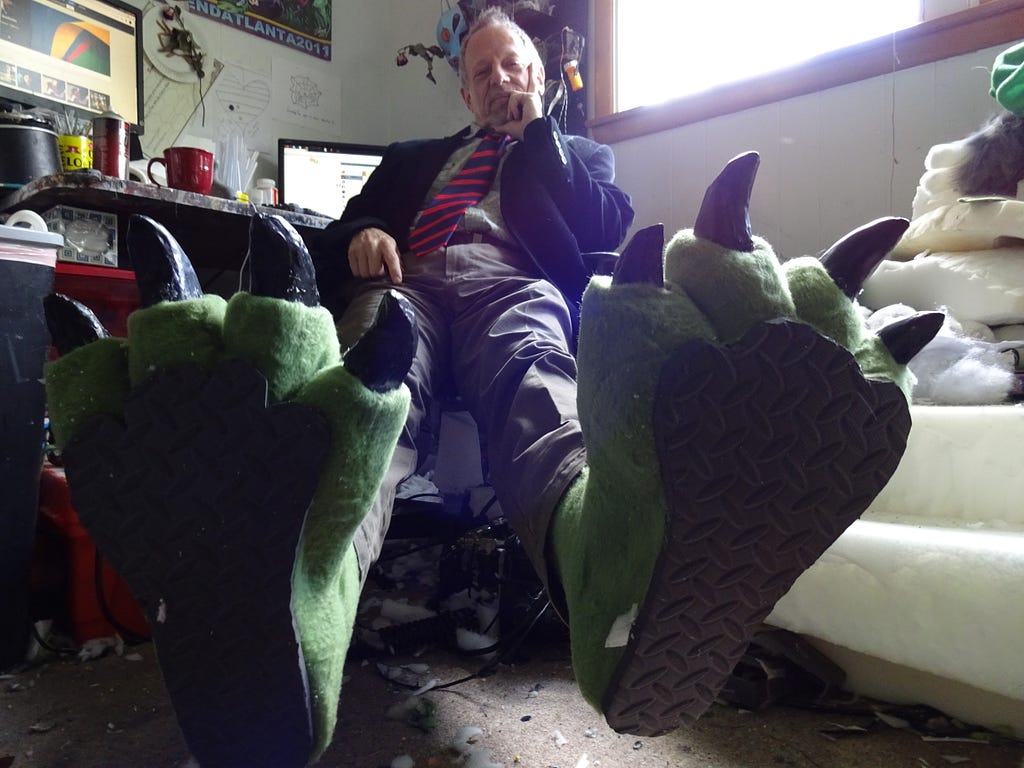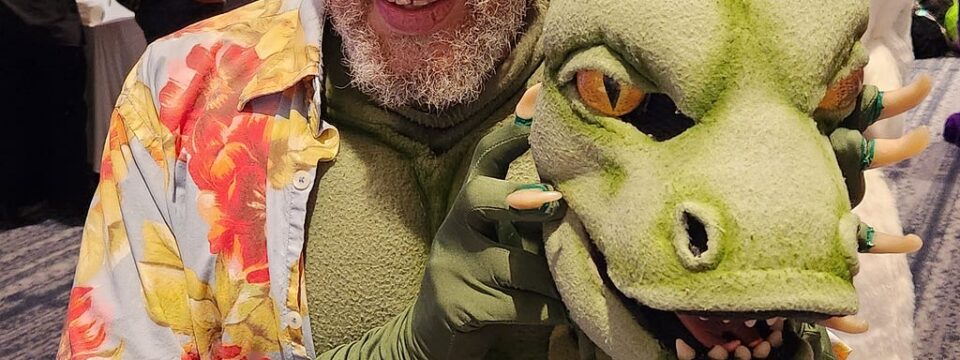
We judge ourselves much more harshly than anyone who might be judging us (and often no one is).
As part of my series about “authors who are making an important social impact”, I had the pleasure of interviewing Joe Strike.
Joe Strike, a long-time furry and expert on the subculture, is the author of Furry Planet: A World Gone Wild. Besides being a certified “grey muzzle,” Strike is a writer and producer who has created hundreds of TV promotions for channels including Bravo and Sci-Fi and worked with talents like Stan Lee, Ralph Bakshi, and the cast of Mystery Science Theater 3000.
Thank you so much for joining us in this interview series! Before we dive into the main focus of our interview, our readers would love to “get to know you” a bit better. Can you tell us a bit about your childhood backstory?
Have you ever heard of “the kid in a candy store?” I’m that kid; my folks owned a candy store in Park Slope Brooklyn which at the time (the 1950s and 60s) was a blue collar, working class neighborhood. Now it’s one of the most desirable and pricey neighborhoods in all of NYC.
Growing up in that store was almost magical; the comic bookshelves were my personal lending library; I’d take a couple, read them over lunch & put them back for someone else to buy. (Hopefully I didn’t leave too many lunch stains on them.) Back then, the comics weren’t all superheroes either; apart from romance and war comics, there were numerous “funny animal” comic books which I particularly enjoyed — more than the superhero comics as a matter of fact.
But I think the cartoons I devoured on TV are what really sparked my imagination and sense of fantasy. I envied all the Looney Tunes characters, their exuberance and freedom to express themselves, and wished I could be one of them. The Popeye and Betty Boop cartoons from the Fleischer studios weren’t as sophisticated but often ventured into surrealism that left me fascinated. I loved Disney animation as well, how lush and fluid it was, but Walt’s creations only showed up occasionally on TV and in the movies.
When you were younger, was there a book that you read that inspired you to take action or changed your life? Can you share a story about that?
I was a voracious reader, but no one particular book comes to mind. However, the library itself helped shape my future political and moral leanings. I used to love going to the Brooklyn Public Library’s massive building near Prospect Park. (In fact, I still do whenever I’m in the neighborhood.) Its dark cavernous lobby gave the building an air of mystery — I was entering a special place full of wonders. (I wish I still had my first, laminated in plastic library card; I remember it so vividly.)
As elementary school kids in the 1950s, we were regularly warned about the dangers of (gasp!) communism. One day the teacher warned us that in Russia the government owned everything and people had to share what there was. I thought, “That sounds like the library — I like the library!” If anything set me on a path towards progressive, liberal values it was that moment.
It has been said that our mistakes can be our greatest teachers. Can you share a story about the funniest mistake you made when you were first starting? Can you tell us what lesson you learned from that?
I was working for a small ad agency when I was given a script for a video presentation which they wanted me to produce. It was God-awfully written, and I complained to my boss. He asked, “Do you think you can do better?” It turned out he had written it! (I never would’ve complained if I knew it was his work.) I don’t recall if I ever produced the video, but I suspect not. The experience wasn’t funny at the time, but if I learned anything, it was to tread cautiously at work. (Not that I ever got good at it.)
Can you describe how you aim to make a significant social impact with your book?
In tribal rituals across the continents and centuries, shamans would adopt animal identities in honor of the anthropomorphic deities they felt were their protectors or to embody a mythical figure of their culture on ceremonial occasions. Animals were a central part of their lives; ancient cultures and indigenous peoples understood the need for this connection. In modern times this primal connection was all but forgotten, reduced to the antics of anthropomorphic cartoon animals or product and sports mascots.
But that primal connection never truly died — and furries are people who feel that connection, that deep identification with animals. It’s an atavistic phenomenon reasserting itself in modern times, as people who previously kept those feelings to themselves, thinking no one could possibly understand what their fascination with anthropomorphic animals meant to them, discovered furry and realized … they were far from alone.
Many people feel there’s something juvenile — or worse — about adults who adopt animal identities and wear fursuits to become those beings; I’ve written Furry Planet and its predecessor Furry Nation to let them know that instinct has reawakened for a reason, perhaps a message to us about our relationship to all life on Earth, and to the planet itself.
Can you share with us the most interesting story that you shared in your book?
The Furry Planet chapter “I Dig a Brony,” describes the unexpected popularity among adults (known as “bronies”) of the My Little Pony: Friendship is Magic TV series, a show originally targeted to adolescent and pre-teen girls. The stories were surprisingly sophisticated, dealing with philosophical issues and appealed to both men and women.
The episode “Do Princesses Dream of Magic Sheep” saved a troubled brony from suicide. In the episode, a princess created a dream monster (a “tantabus”) to punish herself for her past evil deeds. Her friends remind her she has reformed and is no longer that evil pony; the realization shrinks the tantabus to tiny size, which (to my utter amazement watching the episode) she accepts and absorbs into herself. The brony realized he was likewise punishing himself, and that realization helped liberate him from his own demons. He turned his experience into a presentation, which he now offers at Pony conventions, “Living with a Tantabus: On MLP and Sobriety.” As he explained to me at that convention, “Helping others is a terrific way to heal yourself.”
What was the “aha moment” or series of events that made you decide to bring your message to the greater world? Can you share a story about that?
Discovering the furry community (via a surprise invitation to the very first East Coast furry party) was a liberating moment, validating the huge, personal part of my life I kept secret from family and friends — but even though I now had friends who shared my anthropomorphic interests, I still kept my “furry self” secret from everyone else.
Even so, as a writer specializing in popular culture, I considered writing a book about furry from early on. I started saving and collecting early media articles about furry and anthropomorphism-related subjects. I eventually wrote a proposal for a book entitled Furries: Funny Animals and Dogs Playing Poker, downplaying furry itself to describe it as one of many forms of anthropomorphic representation. I showed the proposal to an editor who liked it — but said, “There are two things missing from it: you and other furries.” The idea of revealing myself was so daunting I put the proposal away and didn’t touch it again for at least two years.
Several years later, an old friend commented, out of the blue, “Can you believe they put a ‘f*** me’ look on Nala’s face in The Lion King?”
“That’s nothing,” I said, “compared to some pictures I’ve seen,” referring to pin-up artwork of attractive anthropomorphic females, an aspect of furry creativity.
“What, you mean bestiality?” he asked condescendingly.
I finally revealed my furriness to a friend, a pop culture fan in his own right. As it turned out, he was surprised — and jealous — I was part of a scene he knew nothing about! Perhaps the fact he didn’t instantly end our friendship, and was even intrigued to learn about furry, gave me the courage to finally come out of the furry closet! I renamed my book Furry Nation and wrote a revised outline, interspersing my experiences as a furry with chapters on furry’s numerous aspects. I eventually found an agent and a publisher who released Furry Nation in 2017. This year, I wrote and published a further revised and expanded edition, Furry Planet.
Without sharing specific names, can you tell us a story about a particular individual who was impacted or helped by your cause?
The most gratifying experience of writing Furry Nation (and now Planet) was hearing from several furs who told me the book helped them overcome feelings of shame or guilt over their own fascination or identification with anthropomorphic animals.
Are there three things the community/society/politicians can do to help you address the root of the problem you are trying to solve?
I’m not sure if I have an answer to this question; community, society, and politicians often operate at cross-purposes — and at times, all three seem more interested in finding scapegoats, instead of addressing society’s problems. Furry had its moment in their spotlight recently with rumors and lies about litterboxes and students “behaving like animals” in school. In reality, furry is home to many gay, trans, and autistic people who find acceptance denied to them elsewhere.
The solutions will have to come from individuals reaching out to other individuals; perhaps when enough people come together with the goal of caring about each other, they will create the energy that will change society for the better.
How do you define “Leadership”? Can you explain what you mean or give an example?
I have a personal saying: “To have power is to serve, not rule,” which would define my view of leadership: to inspire people to pursue a common goal, and encourage them to tap into their own power in pursuit of that goal, rather than forcing or intimidating them into doing what you want.

What are your “5 things I wish someone told me when I first started” and why?
My “5 things” are all aspects of the same challenge I think we all face:
- You don’t have to be perfect.
- It’s okay to make mistakes.
- It’s okay to take chances.
- Don’t be afraid to ask for help.
- We judge ourselves much more harshly than anyone who might be judging us (and often no one is).
These inner voices can rob us of our self-confidence and intimidate us into “playing it safe” — and it took me decades to overcome those negative voices.
Can you please give us your favorite “Life Lesson Quote”? Can you share how that was relevant to you in your life?
“It’s not about you” is an expression I’ve heard quite a bit recently, and one that resonates for me. Once I stop thinking about myself as the center of my particular universe, I’m able to relate to and understand other people better. One of my joys in life is making a connection with someone in passing–offering a compliment or sharing a moment of humor that I remember and hope they will as well.
Is there a person in the world, or in the US with whom you would like to have a private breakfast or lunch with, and why? He or she might just see this, especially if we tag them. 🙂
It would have to be Barack Obama, not just because he was once the President, but his combination of sharp intelligence, modesty, and sly sense of humor that lets him poke fun at himself would make him a fascinating person to meet personally.
How can our readers further follow your work online?
FB: https://www.facebook.com/joe.strike.161
TW: https://twitter.com/JoeStrike
IG: https://www.instagram.com/joestrike7827/?hl=en
Also, my website, www.Joestrike.com and my first book’s website, www.furrynation.com
This was very meaningful, thank you so much. We wish you only continued success on your great work!
Social Impact Authors: How & Why Author Joe Strike Is Helping To Change Our World was originally published in Authority Magazine on Medium, where people are continuing the conversation by highlighting and responding to this story.
